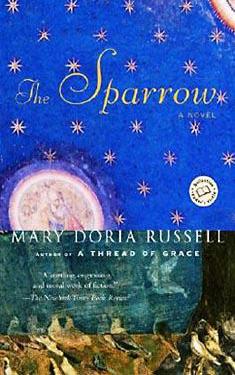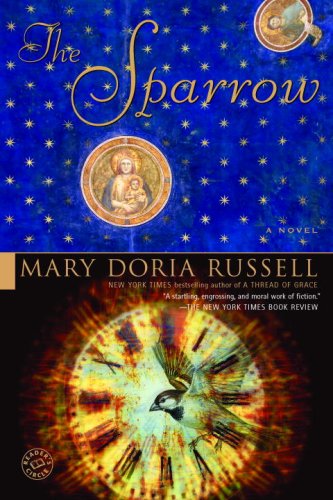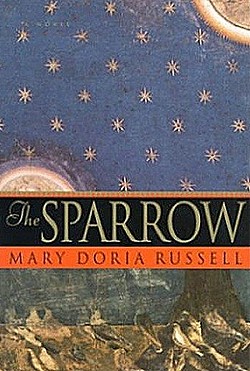
Added By: Administrator
Last Updated: valashain
The Sparrow
| Author: | Mary Doria Russell |
| Publisher: |
Ballantine Books, 2004 Black Swan, 1996 Villard, 1996 |
| Series: | Sparrow Series: Book 1 |
|
1. The Sparrow |
|
| Book Type: | Novel |
| Genre: | Science-Fiction |
| Sub-Genre Tags: | First Contact Theological Near-Future |
| Awards: | |
| Lists: |
|
| Links: |
|
| Avg Member Rating: |
|
|
|
|
Synopsis
The Sparrow is a novel about a remarkable man, a living saint, a life-long celibate and Jesuit priest, who undergoes an experience so harrowing and profound that it makes him question the existence of God. This experience--the first contact between human beings and intelligent extraterrestrial life--begins with a small mistake and ends in a horrible catastrophe.
Excerpt
ROME: DECEMBER 2059
On December 7, 2059, Emilio Sandoz was released from the isolation ward of Salvator Mundi Hospital in the middle of the night and transported in a bread van to the Jesuit Residence at Number 5 Borgo Santo Spìrito, a few minutes' walk across St. Peter's Square from the Vatican. The next day, ignoring shouted questions and howls of journalistic outrage as he read, a Jesuit spokesman issued a short statement to the frustrated and angry media mob that had gathered outside Number 5's massive front door.
"To the best of our knowledge, Father Emilio Sandoz is the sole survivor of the Jesuit mission to Rakhat. Once again, we extend our thanks to the U.N., to the Contact Consortium and to the Asteroid Mining Division of Ohbayashi Corporation for making the return of Father Sandoz possible. We have no additional information regarding the fate of the Contact Consortium's crew members; they are in our prayers. Father Sandoz is too ill to question at this time and his recovery is expected to take months. Until then, there can be no further comment on the Jesuit mission or on the Contact Consortium's allegations regarding Father Sandoz's conduct on Rakhat."
This was simply to buy time.
It was true, of course, that Sandoz was ill. The man's whole body was bruised by the blooms of spontaneous hemorrhages where tiny blood vessel walls had breached and spilled their contents under his skin. His gums had stopped bleeding, but it would be a long while before he could eat normally. Eventually, something would have to be done about his hands.
Now, however, the combined effects of scurvy, anemia and exhaustion kept him asleep twenty hours out of the day. When awake, he lay motionless, coiled like a fetus and almost as helpless.
The door to his small room was nearly always left open in those early weeks. One afternoon, thinking to prevent Father Sandoz from being disturbed while the hallway floor was polished, Brother Edward Behr closed it, despite warnings about this from the Salvator Mundi staff. Sandoz happened to wake up and found himself shut in. Brother Edward did not repeat the mistake.
Vincenzo Giuliani, the Father General of the Society of Jesus, went each morning to look in on the man. He had no idea if Sandoz was aware of being observed; it was a familiar feeling. When very young, when the Father General was just plain Vince Giuliani, he had been fascinated by Emilio Sandoz, who was a year ahead of Giuliani during the decade-long process of priestly formation. A strange boy, Sandoz. A puzzling man. Vincenzo Giuliani had made a statesman's career of understanding other men, but he had never understood this one.
Gazing at Emilio, sick now and almost mute, Giuliani knew that Sandoz was unlikely to give up his secrets any time soon. This did not distress him. Vincenzo Giuliani was a patient man. One had to be patient to thrive in Rome, where time is measured not in centuries but in millennia, where patience and the long view have always distinguished political life. The city gave its name to the power of patience--Romanità. Romanità excludes emotion, hurry, doubt. Romanità waits, sees the moment and moves ruthlessly when the time is right. Romanità rests on an absolute conviction of ultimate success and arises from a single principle, Cunctando regitur mundis: Waiting, one conquers all.
So, even after sixty years, Vincenzo Giuliani felt no sense of impatience with his inability to understand Emilio Sandoz, only a sense of how satisfying it would be when the wait paid off.
The Father General's private secretary contacted Father John Candotti on the Feast of the Holy Innocents, three weeks after Emilio's arrival at Number 5. "Sandoz is well enough to see you now," Johannes Voelker informed Candotti. "Be here by two."
Be here by two! John thought irritably, marching along toward Vatican City from the retreat house where he'd just been assigned a stuffy little room with a view of Roman walls--the stone only inches from his pointless window. Candotti had dealt with Voelker a couple of times since arriving and had taken a dislike to the Austrian from the start. In fact, John Candotti disliked everything about his present situation.
For one thing, he didn't understand why he'd been brought into this business. Neither a lawyer nor an academic, John Candotti was content to have come out on the less prestigious end of the Jesuit dictum, Publish or parish, and he was hip-deep in preparations for the grammar school Christmas program when his superior contacted him and told him to fly to Rome at the end of the week. "The Father General wishes you to assist Emilio Sandoz." That was the extent of his briefing. John had heard of Sandoz, of course. Everyone had heard of Sandoz. But John had no idea how he could be of any use to the man. When he asked for an explanation, he couldn't seem to pry a straight answer out of anyone. He had no practice at this kind of thing; subtlety and indirection were not indoor sports in Chicago.
And then there was Rome itself. At the impromptu farewell party, everyone was so excited for him. "Rome, Johnny!" All that history, those beautiful churches, the art. He'd been excited too, dumb shit. What did he know?
John Candotti was born to flat land, straight lines, square city blocks; nothing in Chicago had prepared him for the reality of Rome. The worst was when he could actually see the building he wanted to get to but found the street he was on curving away from it, leading him to yet another lovely piazza with yet another beautiful fountain, dumping him into another alley going nowhere. Another hour, trapped and frustrated by the hills, the curves, the rat's nest of streets smelling of cat piss and tomato sauce. He hated being lost, and he was always lost. He hated being late, and he was late all the time. The first five minutes of every conversation was John apologizing for being late and his Roman acquaintances assuring him it was no problem.
He hated it all the same, so he walked faster and faster, trying to get to the Jesuit Residence on time for a change, and collected an escort of small children, noisy with derision and obnoxious with delight at this bony, big-nosed, half-bald man with his flapping soutane and pumping arms.
"I'm sorry to keep you waiting." John Candotti had repeated the apology to each person along the way to Sandoz's room and finally to Sandoz himself as Brother Edward Behr ushered him in and left him alone with the man. "The crowd outside is still huge. Do they ever go away? I'm John Candotti. The Father General asked me to help you at the hearings. Happy to meet you." He held out his hand without thinking, withdrawing it awkwardly when he remembered.
Sandoz did not rise from his chair by the window and at first, he either wouldn't or couldn't look in Candotti's direction. John had seen archive images of him, naturally, but Sandoz was a lot smaller than he expected, much thinner; older but not as old as he should have been. What was the calculation? Seventeen years out, almost four years on Rakhat, seventeen years back, but then there were the relativity effects of traveling near light speed. Born a year before the Father General, who was in his late seventies, Sandoz was estimated by the physicists to be about forty-five, give or take a little. Hard years, by the look of him, but not very many of them.
The silence went on a long time. Trying not to stare at the man's hands, John debated whether he should just go. It's way too soon, he thought, Voelker must be crazy. Then, finally, he heard Sandoz ask, "English?"
"American, Father. Brother Edward is English but I'm American."
"No," Sandoz said after a while. "La lengua. English."
Startled, John realized that he'd misunderstood. "Yes. I speak a little Spanish, if you'd prefer that."
"It was Italian, creo. Antes--before, I mean. In the hospital. Sipaj--si yo..." He stopped, close to tears, but got a hold of himself and spoke deliberately. "It would help ... if I could hear ... just one language for a while. English is okay."
"Sure. No problem. We'll stick to English," John said, shaken. Nobody had told him Sandoz was this far gone. "I'll make this a short visit, Father. I just wanted to introduce myself and see how you're doing. There's no rush about preparing for the hearings. I'm sure they can be postponed until you're well enough to..."
"To do what?" Sandoz asked, looking directly at Candotti for the first time. A deeply lined face, Indian ancestry plain in the high-bridged nose, the wide cheekbones, the stoicism. John Candotti could not imagine this man laughing.
To defend yourself, John was going to say, but it seemed mean. "To explain what happened."
The silence inside the Residence was noticeable, especially by the window, where the endless carnival noise of the city could be heard. A woman was scolding a child in Greek. Tourists and reporters milled around, shouting over the constant roar of the usual Vatican crowds and the taxi traffic. Repairs went on incessantly to keep the Eternal City from falling to pieces, the construction workers yelling, machinery grinding.
"I have nothing to say." Sandoz turned away again. "I shall withdraw from the Society."
"Father Sandoz--Father, you can't expect the Society to let you walk away without understanding what happened out there. You may not want to face a hearing but whatever happens in here is nothing compared to what they'll put you through outside, the moment you walk out the door," John told him. "If we understood, we could help you. Make it easier for you, maybe?" There was no reply, only a slight hardening of the face profiled at the window. "Okay, look. I'll come back in a few days. When you're feeling better, right? Is there anything I can bring you? Someone I could contact for you?"
"No." There was no force behind the voice. "Thank you."
John suppressed a sigh and turned toward the door. His eyes swept past a sketch, lying on top of the small plain bureau. On something like paper, drawn in something like ink. A group of VaRakhati. Faces of great dignity and considerable charm. Extraordinary eyes, frilled with lashes to guard against the brilliant sunlight. Funny how you could tell that these were unusually handsome individuals, even when unfamiliar with their standards of beauty. John Candotti lifted the drawing to look at it more closely. Sandoz stood and took two swift steps toward him.
Sandoz was probably half his size and sicker than hell but John Candotti, veteran of Chicago streets, was startled into retreating. Feeling the wall against his back, he covered his embarrassment with a smile and put the drawing back on the bureau. "They're a handsome race, aren't they," he offered, trying to defuse whatever emotion was working on the man in front of him. "The ... folks in the picture--friends of yours, I guess?"
Sandoz backed away and looked at John for a few moments, as though calculating the other man's response. The daylight behind his hair lit it up, and the contrast hid his expression. If the room had been brighter or if John Candotti had known him better, he might have recognized a freakish solemnity that preceded any statement Sandoz expected to induce hilarity, or outrage. Sandoz hesitated and then found the precise word he wanted.
"Colleagues," he said at last.
Copyright © 1996 by Mary Doria Russell
Reviews
Images





















 Full Details
Full Details





